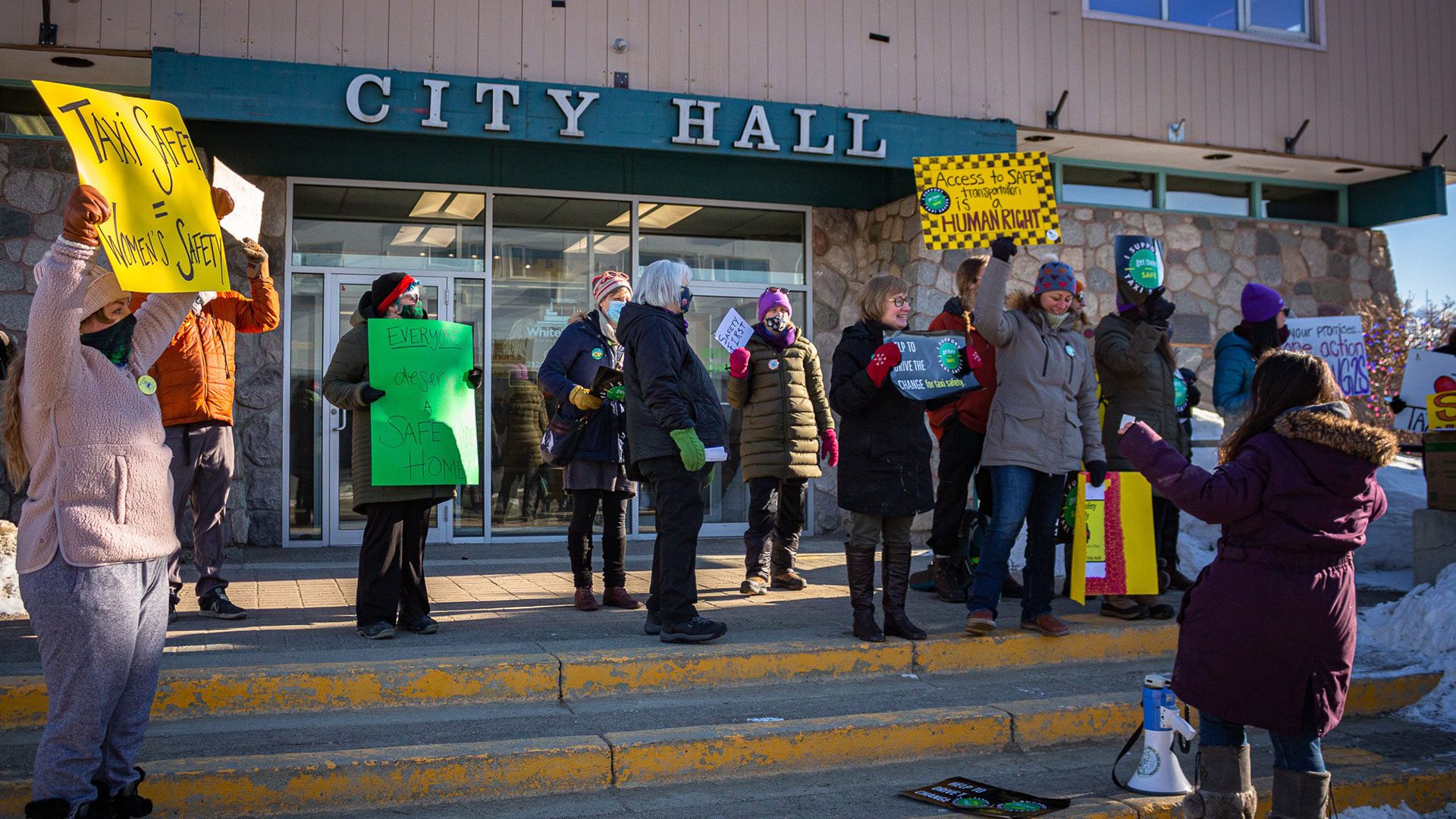Around two dozen people gathered outside Whitehorse city hall on Tuesday demanding safer taxis for women, especially Indigenous women.
“It’s unfortunate we have to have this rally in general,” said organizer Meesha Whittkopf. “We’re just here to show our support and to push bylaw here. We’re trying to keep people accountable.”
The rally was part of a new taxi safety campaign by the Yukon Aboriginal Women’s Council. The campaign is aimed at promoting taxi safety and prevention as well as spreading awareness about sexual harassment and gender-based violence
According to a recent report by the Yukon Women’s Coalition (YWC), 62 per cent of respondents who identified as women reported incidents related to harassment, sexualized harassment and assault when taking a taxi.
It also found Indigenous women are three times more likely to report harassment when taking a taxi in Whitehorse compared to non-Indigenous women.
Whittkopf, a taxi safety coordinator working on the campaign, said the findings in the report are extremely concerning, particularly in regards to Indigenous women.
She’s hopeful the rally will put pressure on city bylaw services to implement the recommendations in the report. That includes increased enforcement, forming a transportation safety committee and amending the vehicle for hire bylaw.
She notes bylaw has also approached her for input on driver permit renewal.
“(I’m) hopeful because it is these people that show up that push these advocacy issues even further,” she says.
Also in attendance was Michelle Friesen, a Whitehorse city councillor whose family is from the Ta’an Kwach’an Council.
She said it’s difficult seeing Indigenous women like herself disproportionally impacted by gender-based violence.
“I think any part that I can play in hoping to end gender-based violence, I’m happy to come out and do that,” she said.
Friesen said she would continue to use her voice at the city level to move taxi safety issues forward.

She noted council recently met with bylaw and RCMP on March 3 where they discussed safety recommendations from the report in the administration roundtable meeting, which is not open to the public.
“There were a number of recommendations that were brought forward to us that I look forward to discussing further with council,” she said.
Aja Mason, executive director for the Yukon Status of Women Council (YSWC), said in an email that representatives from YWC and YSWC also recently met with bylaw and the RCMP.
She noted bylaw has agreed to do a public awareness campaign which will include what role the local authority plays in taxi safety and how to report an incident or assault, which she described as “a win.”
Mason said there are several gaps in the system and improvements need to be made. For instance, it’s unclear how bylaw services and RCMP share reported instances of gender-based violence occurring in taxis with one another.
“For example, bylaw services claims that any reports they receive of criminal activity occurring in a Whitehorse taxi, they automatically forward to RCMP. It is unclear how RCMP then feed information back to Bylaw Services about particular cab drivers/companies [sic] etc.,” she said.
“If there are no clear frameworks in place that govern how data is shared from the RCMP to Bylaw Services, we are concerned that the current system is lacking the appropriate mechanisms to respond taxi-based violence.”
Mason said she wants to see RCMP, bylaw, the city and women’s groups working together to make taxis safer for all women. She’s hopeful stakeholders will accept the report’s recommendation to create a funded transportation safety committee.
Jonna Reaume, a coordinator with YWC, also said in an email that during the recent meeting bylaw was in favour of including a training component for drivers on sexual assault awareness and prevention. Reaume said the training needs to be formalized by YWC which it intends to do.
“This is why regular meetings through the Transportation Safety Committee (City of Whitehorse – Bylaw Services, RCMP, Women’s Coalition, taxi companies and riders) will be essential in ensuring the report recommendations are followed through on,” she said.
Reaume said her organization is still waiting to hear back regarding the results of the March 3 roundtable meeting.
Women’s taxi safety is not just an issue in Yukon.
Last week APTN spoke to a woman from the Mathias Colomb Cree Nation who alleges a Winnipeg taxi driver demanded a “deposit” before he would begin a ride with her.
In September 2021, another First Nations woman in Winnipeg accused a cab driver of assaulting her and leaving her with bruises and bleeding fingertips. The driver was later arrested and charged with forcible confinement and assault.









